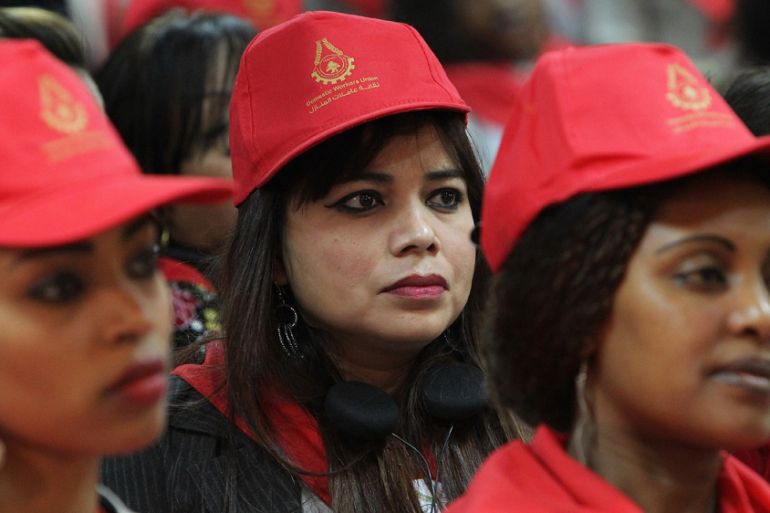Lebanon’s migrant workers move to form labour union
Subjected to beatings and rapes, Beirut’s domestic workers push to set up Arab world’s first labour union.

Migrant domestic workers in Lebanon are pushing to form the first labour union in the Arab world after being subjected to beatings and rape.
More than 200 women from Ethiopia, Sri Lanka and Bangladesh attended a founding conference in Beirut on Sunday.
Keep reading
list of 4 itemsPalestinian Prisoner’s Day: How many are still in Israeli detention?
‘Mama we’re dying’: Only able to hear her kids in Gaza in their final days
Europe pledges to boost aid to Sudan on unwelcome war anniversary
“We want to be treated like human beings, like real workers,” said Leticia, a Filipina who was assaulted and raped by her employer several years ago and only gave her first name. “With this union, I will no longer feel alone in the face of abuse,” she said.
The union has the support of the National Federation of Workers’ Unions in Lebanon (FENASOL), which says the country has a quarter of a million migrant domestic workers but has yet to win recognition from the government.
Lebanon’s Labour Minister Sejaane Azzi stated that the law does not allow foreigners to set up a union, but that “new laws are needed to improve the situation for housemaids”.
We want to be treated like human beings, like real workers. With this union, I will no longer feel alone in the face of abuse.
Rights groups have frequently accused Lebanon and various Gulf States of racist and degrading treatment of migrant domestic workers who are often referred to as “servants” or “Sri Lankans” regardless of their nationality.
Though public awareness regarding the plight of migrant workers has increased in recent years, activists say there are no mechanisms in place to protect women when they are mistreated or when contracts are breached.
The notion of creating a domestic workers’ union emerged after the International Labour Organisation’s (ILO) Convention 189 came into force in 2013.
The convention stipulates that domestic workers have the right to have at least one day off per week and should be paid a minimum wage.
Under the current and controversial “kafala” sponsorship system enforced in Lebanon, migrant domestic workers are left at the mercy of their employers.
Workers are prevented from moving to a new job, and changing jobs often requires the employer to give the employee permission.
A few countries, such as the Philippines, have consequently barred their citizens from taking up new work contracts in Lebanon.
“I have a friend whose employer did not allow her to eat any more than a piece of bread and a bit of lettuce, because she did not want her to gain weight,” Gemma, a 48-year-old living in Lebanon, said.
“Some employers lock up their domestic workers in their rooms, while others won’t pay their employees for months at a time.”
Rights groups have repeatedly raised concerns about the issue of domestic workers in the region.
Human Rights Watch said last year that Lebanese authorities were refusing to renew the residence permits of children born to migrant domestic workers.
Authorities later began deporting children, often separating them from their mothers.